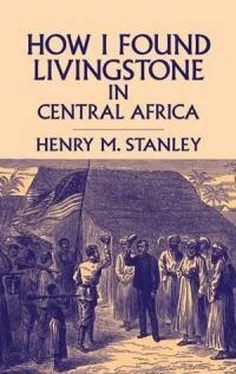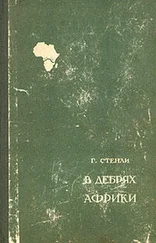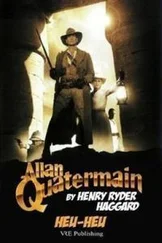Генри Стенли - How I Found Livingstone
Здесь есть возможность читать онлайн «Генри Стенли - How I Found Livingstone» весь текст электронной книги совершенно бесплатно (целиком полную версию без сокращений). В некоторых случаях можно слушать аудио, скачать через торрент в формате fb2 и присутствует краткое содержание. Год выпуска: 1872, Жанр: Биографии и Мемуары, на английском языке. Описание произведения, (предисловие) а так же отзывы посетителей доступны на портале библиотеки ЛибКат.
- Название:How I Found Livingstone
- Автор:
- Жанр:
- Год:1872
- ISBN:нет данных
- Рейтинг книги:5 / 5. Голосов: 1
-
Избранное:Добавить в избранное
- Отзывы:
-
Ваша оценка:
- 100
- 1
- 2
- 3
- 4
- 5
How I Found Livingstone: краткое содержание, описание и аннотация
Предлагаем к чтению аннотацию, описание, краткое содержание или предисловие (зависит от того, что написал сам автор книги «How I Found Livingstone»). Если вы не нашли необходимую информацию о книге — напишите в комментариях, мы постараемся отыскать её.
How I Found Livingstone — читать онлайн бесплатно полную книгу (весь текст) целиком
Ниже представлен текст книги, разбитый по страницам. Система сохранения места последней прочитанной страницы, позволяет с удобством читать онлайн бесплатно книгу «How I Found Livingstone», без необходимости каждый раз заново искать на чём Вы остановились. Поставьте закладку, и сможете в любой момент перейти на страницу, на которой закончили чтение.
Интервал:
Закладка:
At night the warriors returned from the forest; the alarm proved to be without foundation. At first it was generally reported that the invaders were Wahehe, or the Wadirigo, as that tribe are scornfully called from their thieving propensities. The Wahehe frequently make a foray upon the fat cattle of Ugogo. They travel from their own country in the south-east, and advance through the jungle, and when about to approach the herds, stoop down, covering their bodies with their shields of bull-hide. Having arrived between the cattle and the herdsmen, they suddenly rise up and begin to switch the cattle heartily, and, having started them off into the jungle in the care of men already detailed for the work, they turn about, and plant their shields before them, to fight the aroused shepherds.
On the 30th we arrived at Khonze, which is remarkable for the mighty globes of foliage which the giant sycamores and baobabs put forth above the plain. The chief of Khonze boasts of four tembes, out of which he could muster in the aggregate fifty armed men; yet this fellow, instigated by the Wanyamwezi residents, prepared to resist our advance, because I only sent him three doti-twelve yards of cloth-as honga.
We were halted, waiting the return of a few friendly Wagogo travellers who had joined us, and who were asked to assist Bombay in the negotiation of the tribute, when the Wagogo returned to us at breathless speed, and shouted out to me, "Why do you halt here? Do you wish to die? These pagans will not take the tribute, but they boast that they will eat up all your cloth."
The renegade Wanyamwezi who had married into Wagogo families were always our bane in this country. As the chief of Khonze came up I ordered the men to load their guns, and I loaded my own ostentatiously in his presence, and then strode up to him, and asked if he had come to take the cloth by force, or if he were going to accept quietly what I would give him. As the Mnyamwezi who caused this show of hostilities was beginning to speak, I caught him by the throat, and threatened to make his nose flatter if he attempted to speak again in my presence, and to shoot him first, if we should be forced to fight. The rascal was then pushed away into the rear. The chief, who was highly amused with this proceeding, laughed loudly at the discomfiture of the parasite, and in a short time he and I had settled the tribute to our mutual satisfaction, and we parted great friends. The Expedition arrived at Sanza that night.
On the 31st we came to Kanyenyi, to the great Mtemi-Magomba's- whose son and heir is Mtundu M'gondeh. As we passed by the tembe of the great Sultan, the msagira, or chief counsellor, a pleasant grey-haired man, was at work making a thorn fence around a patch of young corn. He greeted the caravan with a sonorous "Yambo," and, putting himself at its head, he led the way to our camp. When introduced to me he was very cordial in his manner. He was offered a kiti-stool and began to talk very affably. He remembered my predecessors, Burton, Speke, and Grant, very well; declared me to be much younger than any of them; and, recollecting that one of the white men used to drink asses' milk (Burton?), offered to procure me some. The way I drank it seemed to give him very great satisfaction.
His son, Unamapokera, was a tall man of thirty or thereabouts, and he conceived a great friendship for me, and promised that the tribute should be very light, and that he would send a man to show me the way to Myumi, which was a village on the frontier of Kanyenyi, by which I would be enabled to avoid the rapacious Kisewah, who was in the habit of enforcing large tribute from caravans.
With the aid of Unamapokera and his father, we contrived to be mulcted very lightly, for we only paid ten doti, while Burton was compelled to pay sixty doti or two hundred and forty yards of cloth.
On the 1st of April, rising early, we reached Myumi after a four hours' march; then plunged into the jungle, and, about 2 P.M. arrived at a large ziwa, or pond, situate in the middle of a jungle; and on the next day, at 10 A.M., reached the fields of Mapanga. We were passing the village of Mapanga to a resting-place beyond the village, where we might breakfast and settle the honga, when a lad rushed forward to meet us, and asked us where we were going. Having received a reply that we were going to a camping-place, he hastened on ahead, and presently we heard him talking to some men in a field on our right.
In the meantime, we had found a comfortable shady place, and had come to a halt; the men were reclining on the ground, or standing up near their respective loads; Bombay was about opening a bale, when we heard a great rush of men, and loud shouts, and, immediately after, out rushed from the jungle near by a body of forty or fifty armed men, who held their spears above their heads, or were about to draw their bows, with a chief at their head, all uttering such howls of rage as only savages can, which sounded like a long-drawn "Hhaat-uh-Hhaat-uhh-uhh," which meant, unmistakably, "You will, will you? No, you will not!" — at once determined, defiant, and menacing.
I had suspected that the voices I heard boded no good to us, and I had accordingly prepared my weapons and cartridges. Verily, what a fine chance for adventure this was! One spear flung at us, or one shot fired into this minatory mob of savages, and the opposing' bands had been plunged into a fatal conflict! There would have been no order of battle, no pomp of war, but a murderous strife, a quick firing of breech-loaders, and volleys from flint-lock muskets, mixed with the flying of spears and twanging of bows, the cowardly running away at once, pursued by yelping savages; and who knows how it all would have terminated? Forty spears against forty guns-but how many guns would not have decamped? Perhaps all, and I should have been left with my boy gunbearers to have my jugular deliberately severed, or to be decapitated, leaving my head to adorn a tall pole in the centre of a Kigogo village, like poor Monsieur Maizan's at Dege la Mhora, in Uzaramo. Happy end of an Expedition! And the Doctor's Journal lost for ever-the fruits of six years' labor!
But in this land it will not do to fight unless driven to the very last extremity. No belligerent Mungo Park can be successful in Ugogo unless he has a sufficient force of men with him. With five hundred Europeans one could traverse Africa from north to south, by tact, and the moral effect that such a force would inspire. Very little fighting would be required.
Without rising from the bale on which I was seated, I requested the kirangozi to demand an explanation of their furious hubbub and threatening aspect; if they were come to rob us.
"No," said the chief; "we do not want to stop the road, or to rob you; but we want the tribute."
"But don't you see us halted, and the bale opened to send it to you? We have come so far from your village that after the tribute is settled we can proceed on our way, as the day is yet young."
The chief burst into a loud laugh, and was joined by ourselves. He evidently felt ashamed of his conduct for he voluntarily offered the explanation, that as he and his men were cutting wood to make a new fence for his village, a lad came up to him, and said that a caravan of Wangwana were about passing through the country without stopping to explain who they were. We were soon very good friends. He begged of me to make rain for him, as his crops were suffering, and no rain had fallen for months. I told him that though white people were very great and clever people, much superior to the Arabs, yet we could not make rain. Though very much disappointed, he did not doubt my statement, and after receiving his honga, which was very light, he permitted us to go on our way, and even accompanied us some distance to show us the road.
At 3 P.M. we entered a thorny jungle; and by 5 P.M. we had arrived at Muhalata, a district lorded over by the chief Nyamzaga. A Mgogo, of whom I made a friend, proved very staunch. He belonged to Mulowa, a country to the S.S.E., and south of Kulabi; and was active in promoting my interests by settling the tribute, with the assistance of Bombay, for me. When, on the next day, we passed through Kulabi on our way to Mvumi, and the Wagogo were about to stop us for the honga, he took upon himself the task of relieving us from further toll, by stating we were from Ugogo or Kanyenyi. The chief simply nodded his head, and we passed on. It seems that the Wagogo do not exact blackmail of those caravans who intend only to trade in their own country, or have no intention of passing beyond their own frontier.
Читать дальшеИнтервал:
Закладка:
Похожие книги на «How I Found Livingstone»
Представляем Вашему вниманию похожие книги на «How I Found Livingstone» списком для выбора. Мы отобрали схожую по названию и смыслу литературу в надежде предоставить читателям больше вариантов отыскать новые, интересные, ещё непрочитанные произведения.
Обсуждение, отзывы о книге «How I Found Livingstone» и просто собственные мнения читателей. Оставьте ваши комментарии, напишите, что Вы думаете о произведении, его смысле или главных героях. Укажите что конкретно понравилось, а что нет, и почему Вы так считаете.












